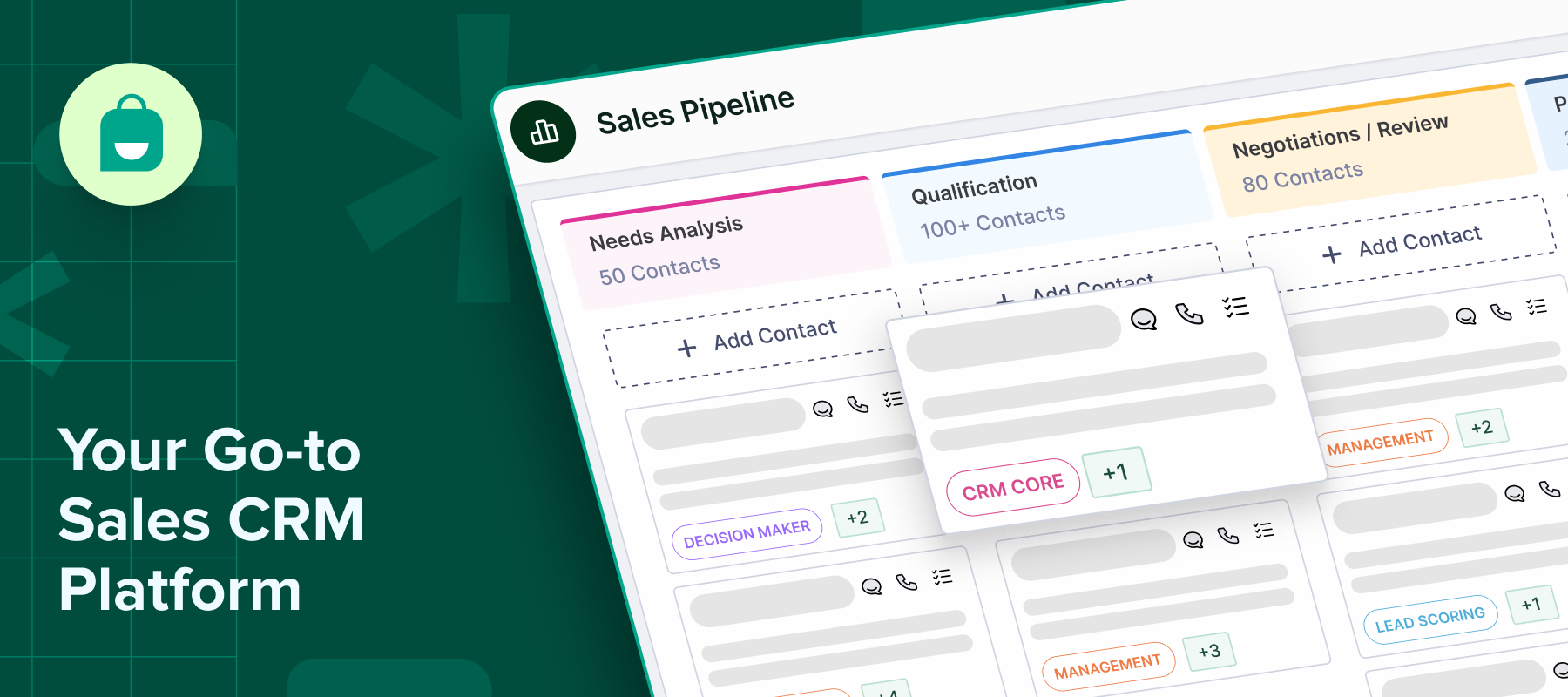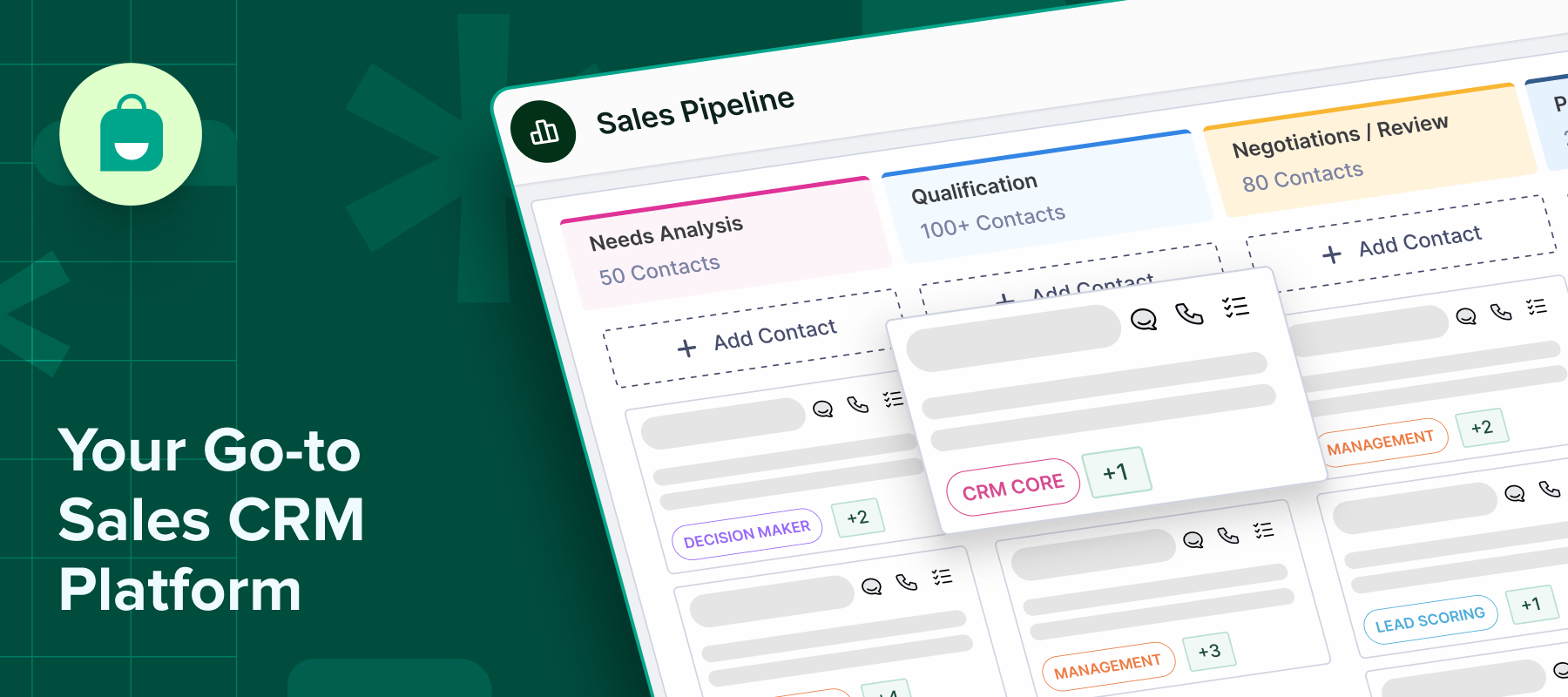Sales in 2025 is all about precision and efficiency. Teams are expected to manage more leads, track more data, and maintain stronger customer relationships, all while keeping processes smooth and consistent.
This is where sales CRM automation becomes essential. It’s designed to take over repetitive tasks like follow-ups, data entry, lead tracking, and reminders, reducing manual effort and keeping everything on track.
The idea is simple, let the software handle routine work so your sales team can concentrate on meaningful conversations and closing deals. But to make that a reality, you need the right tools.
In this blog, we explore the top sales CRM tools for automation in 2025, giving you a clear view of the best options to improve your sales process.
Why Automation is Crucial for Sales Teams in 2025
Here’s why automation is crucial for sales teams in 2025:
1. Sales cycles are getting more complex and multi-channel
Sales cycles today involve multiple steps and touchpoints, like email, calls, social media, and live chat. Managing this manually is no longer practical.
Automation ensures every interaction is tracked and aligned, giving your team full visibility and keeping the process smooth, no matter how complex the journey gets.
2. Need to scale outreach without sacrificing personalization
Sales teams are expected to reach more prospects than ever, but blasting out generic messages falls flat.
Automation allows you to scale outreach while personalizing messages to each lead’s behavior and needs. This keeps communication personal and relevant, even at volume.
3. Automating repetitive tasks increases productivity and reduces errors
Tasks like data entry, follow-up reminders, and scheduling eat up hours and are prone to mistakes when handled manually.
Automation takes over these routine tasks, improving accuracy and freeing your team to focus on selling, not admin.
4. Enables better lead scoring, routing, and real-time follow-ups
Speed and accuracy are key in closing deals. Automation improves lead scoring and routing by analyzing real-time data, ensuring leads are prioritized and assigned correctly. It also enables instant follow-ups, helping your team respond faster and keeping deals moving forward.
Top Sales CRM Tools for Automation in 2025
Here are some top sales CRM for automation in 2025:
1. Interakt CRM
Interakt CRM is a WhatsApp-first sales CRM designed to help businesses automate sales, nurture leads, and close deals faster, directly within WhatsApp and Instagram. With a quick setup time of under 30 minutes and trusted by over 50,000 businesses. It’s built for teams looking to streamline conversational sales and improve response times.
Key Features:
-Effortless lead generation from WhatsApp, Instagram, and APIs
-Automated WhatsApp workflows and personalized messaging
-Unified customer view to track all interactions and documents
-Visual sales pipeline with role-based access and task management
-In-app follow-ups, payment reminders, and WhatsApp payments
-AI-powered insights for smarter targeting and conversions
-60+ plug-and-play integrations
Pricing:
-₹2,499/month
2. HubSpot CRM
HubSpot CRM is a versatile, all-in-one platform offering free tools for sales, marketing, service, and operations teams. It provides a visual sales pipeline, real-time activity tracking, and detailed reporting, making it easy to manage contacts and deals at scale. With AI-powered features, it helps sales teams close deals faster and more efficiently.
Key Features:
-Visual sales pipeline and -deal tracking
-AI email writer and meeting scheduler
-Live chat and activity notifications
-Dashboard, reporting, and pipeline management
-Email templates and call tracking
Pricing:
-Starter: $15/month per seat
-Professional: $1,300/month
-Enterprise: $4,700/month
3. Zoho CRM
Zoho CRM is an AI-powered platform designed to help businesses scale with advanced workflows, contextual customer engagement, and deep analytics. It offers a 360° view of customer data, seamless multi-channel communication, and strong privacy compliance, making it a solid choice for growing teams across industries.
Key Features:
-Advanced workflows and sales cadences
-AI-powered assistant (Zia) and ChatGPT integration
-Sales forecasting and performance tracking
-Multi-channel customer engagement
-Deep BI and predictive analytics
-1,000+ app integrations via Zoho Marketplace
Pricing:
-Standard: ₹1,300/user/month
-Professional: ₹2,100/user/month
-Enterprise: ₹3,000/user/month
-Ultimate: ₹3,200/user/month
4. Freshsales
Freshsales is an AI-powered CRM that helps businesses streamline sales, improve productivity, and close deals faster. With Freddy AI it offers smart lead scoring, automated workflows, and deep insights to keep sales teams focused and efficient.
Key Features:
-AI-powered lead scoring and deal insights
-Kanban view for contacts, accounts, and deals
-Multi-channel engagement (chat, email, phone)
-Advanced workflows and sales sequences
-Territory management and custom reports
Pricing:
-Growth: ₹749/user/month
-Pro: ₹3,239/user/month
-Enterprise: ₹4,899/user/month
5. Pipedrive
Pipedrive is an easy-to-use, AI-powered CRM built to help sales teams manage pipelines, automate workflows, and close deals faster. It offers a visual, customizable sales pipeline, automated lead nurturing, and smart insights to keep teams focused and productive.
Key Features:
-AI-powered lead management and deal tracking
-Customizable Kanban-style pipelines
-Sales automation and activity reminders
-Real-time sales insights and forecasting
-Full email sync and live chat support
-500+ integrations through Pipedrive Marketplace
Pricing:
-Essential: $14/user/month
-Advanced: $24/user/month
-Professional: $49/user/month
-Power: $59/user/month
-Enterprise: $79/user/month
Implementing CRM Automation in Your Sales Process
Here’s how you can implement CRM automation in your sales process:
1. Identify tasks ripe for automation
Start by pinpointing the tasks that take up the most time but don’t need deep human input. Common examples include follow-ups, meeting reminders, lead scoring, and data entry. Listing these out helps you see where automation can save the most effort immediately.
2. Map out sales workflows before configuring automation
Next, take a close look at your existing sales workflows. Map each step clearly from initial contact to closing, to understand where automation should fit in. This ensures your automation supports your process rather than disrupting it.
3. Set clear rules and triggers for automation sequences
With workflows mapped, define the exact rules and triggers for each automation. Decide what should happen and when. For example, sending a follow-up email two days after a lead opens a proposal.
4. Test, monitor, and refine based on performance data
Once live, monitor how your automation performs. Track key metrics like response times and conversion rates to spot what’s working and what needs tweaking. Regular testing and adjustments keep your system sharp and aligned with your goals.
5. Train sales reps on how to use automation tools effectively
Finally, make sure your sales team is comfortable with the tools. Provide hands-on training and clear documentation so reps understand how automation supports their work and how to step in manually when needed.
Common Challenges and How to Overcome Them
Here are some common challenges you may face with CRM automation, and how to overcome them effectively:
Over-automation leading to impersonal outreach
Over-automation can result in cold, generic messaging that disengages prospects. To maintain a personal touch, it’s important to use dynamic fields within templates, such as names, company details, and recent interactions. Interakt CRM supports this by enabling personalized WhatsApp messaging at scale, ensuring communication stays relevant and engaging.
Workflow complexity causing errors
Highly complex workflows increase the risk of errors and inefficiencies. The best approach is to keep workflows simple at the outset and expand gradually. CRMs with visual workflow builders, like Interakt, make it easier to design and manage processes clearly, reducing the likelihood of mistakes.
Low team adoption
One of the biggest challenges businesses face is low adoption, where teams don’t fully use the CRM. This is usually due to complexity or unclear value. Practical, hands-on training that shows how the tool makes daily tasks easier and saves time can tackle this.
Future Trends in Sales CRM Automation
Here’s a look at the key trends shaping the next wave of CRM automation and how they’ll transform sales processes:
1. AI-powered predictive sales recommendations and forecasting
AI will soon play a larger role in sales, with CRM systems using predictive analytics to spot high-potential leads and deliver accurate sales forecasts. This will help teams focus on the most promising opportunities, with tools like Interakt already beginning to integrate AI-driven insights.
2. Hyper-personalized customer journeys based on behavior data
Customer journeys will become increasingly personalized, with CRMs using deeper behavioral data to personalize every touchpoint. Automation will allow sales teams to trigger highly specific messages and offers, based on real-time actions.
3. Conversational CRM with chat and voice automation
CRM systems will become increasingly conversational, using chatbots and voice automation to manage more customer interactions. This will streamline engagement, reduce response times, and free up sales teams for higher-value tasks.
4. Integration with GPT-style assistants to write and optimize outreach
AI writing assistants will become a key feature in CRMs, helping sales teams draft, personalize, and refine outreach with minimal effort. This will speed up content creation and improve message quality across all channels.
5. Automated multi-touch cadences across email, WhatsApp, SMS
Sales outreach is moving toward fully automated, multi-channel cadences that sync email, WhatsApp, and SMS in a single flow. While many CRMs are still catching up, Interakt offers advanced WhatsApp automation and simple plug-and-play integrations, making unified campaigns easy to manage.
Conclusion
CRM automation tools are essential for streamlining sales, improving productivity, and staying competitive in today’s fast-paced market.
Choosing the right platform can make all the difference. Interakt offers a powerful, easy-to-use solution to help your team automate smarter and close deals faster.







